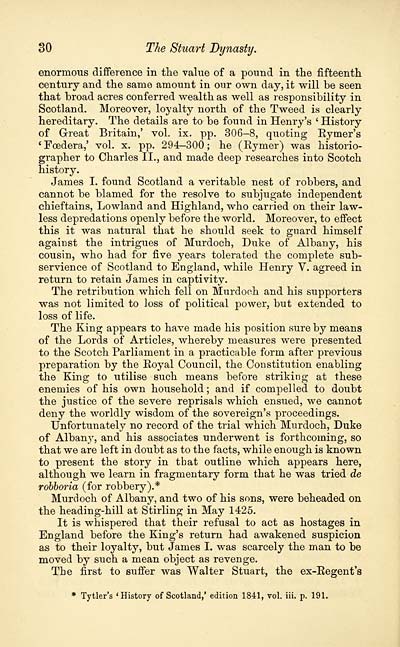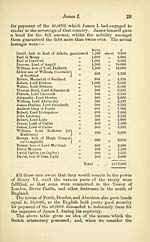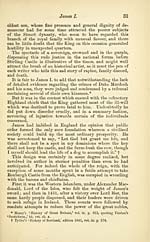Stuart dynasty
(50) Page 30
Download files
Complete book:
Individual page:
Thumbnail gallery: Grid view | List view

30 The Stuart Dynasty.
enormous difference in the value of a pound in the fifteenth
century and the same amount in our own day, it will be seen
that broad acres conferred wealth as well as responsibility in
Scotland. Moreover, loyalty north of the Tweed is clearly
hereditary. The details are to be found in Henry's ' History
of Grreat Britain,' vol. ix. pp. 306-8, quoting Eymer's
' Foedera,' vol. x. pp. 294-300 ; he (Kymer) was historio-
grapher to Charles II., and made deep researches into Scotch
history.
James I. found Scotland a veritable nest of robbers, and
cannot be blamed for the resolve to subjugate independent
chieftains, Lowland and Highland, who carried on their law-
less depredations openly before the world. Moreover, to effect
this it was natural that be should seek to guard himself
against the intrigues of Murdoch, Duke of Albany, his
cousin, who had for five years tolerated the complete sub-
servience of Scotland to England, while Henry V. agreed in
return to retain James in captivity.
The retribution which fell on Murdoch and his supporters
was not limited to loss of political power, but extended to
loss of life.
The King appears to have made his position sure by means
of the Lords of Articles, whereby measures were presented
to the Scotch Parliament in a practicable form after previous
preparation by the Koyal Council, the Constitution enabling
the King to utilise such means before striking at these
enemies of his own household ; and if compelled to doubt
the justice of the severe reprisals which ensued, we cannot
deny the worldly wisdom of the sovereign's proceedings.
Unfortunately no record of the trial which Murdoch, Duke
of Albany, and his associates underwent is forthcoming, so
that we are left in doubt as to the facts, while enough is known
to present the story in that outline which appears here,
although we learn in fragmentary form that he was tried de
rdbboria (for robbery).*
Murdoch of Albany, and two of his sons, were beheaded on
the heading-hill at Stirling in May 1425.
It is whispered that their refusal to act as hostages in
England before the King's return had awakened suspicion
as to their loyalty, but James I. was scarcely the man to be
moved by such a mean object as revenge.
The first to suffer was Walter Stuart, the ex-Eegent's
* Tytler's 'History of Scotland,' edition 1841, vol. iii. p. 191.
enormous difference in the value of a pound in the fifteenth
century and the same amount in our own day, it will be seen
that broad acres conferred wealth as well as responsibility in
Scotland. Moreover, loyalty north of the Tweed is clearly
hereditary. The details are to be found in Henry's ' History
of Grreat Britain,' vol. ix. pp. 306-8, quoting Eymer's
' Foedera,' vol. x. pp. 294-300 ; he (Kymer) was historio-
grapher to Charles II., and made deep researches into Scotch
history.
James I. found Scotland a veritable nest of robbers, and
cannot be blamed for the resolve to subjugate independent
chieftains, Lowland and Highland, who carried on their law-
less depredations openly before the world. Moreover, to effect
this it was natural that be should seek to guard himself
against the intrigues of Murdoch, Duke of Albany, his
cousin, who had for five years tolerated the complete sub-
servience of Scotland to England, while Henry V. agreed in
return to retain James in captivity.
The retribution which fell on Murdoch and his supporters
was not limited to loss of political power, but extended to
loss of life.
The King appears to have made his position sure by means
of the Lords of Articles, whereby measures were presented
to the Scotch Parliament in a practicable form after previous
preparation by the Koyal Council, the Constitution enabling
the King to utilise such means before striking at these
enemies of his own household ; and if compelled to doubt
the justice of the severe reprisals which ensued, we cannot
deny the worldly wisdom of the sovereign's proceedings.
Unfortunately no record of the trial which Murdoch, Duke
of Albany, and his associates underwent is forthcoming, so
that we are left in doubt as to the facts, while enough is known
to present the story in that outline which appears here,
although we learn in fragmentary form that he was tried de
rdbboria (for robbery).*
Murdoch of Albany, and two of his sons, were beheaded on
the heading-hill at Stirling in May 1425.
It is whispered that their refusal to act as hostages in
England before the King's return had awakened suspicion
as to their loyalty, but James I. was scarcely the man to be
moved by such a mean object as revenge.
The first to suffer was Walter Stuart, the ex-Eegent's
* Tytler's 'History of Scotland,' edition 1841, vol. iii. p. 191.
Set display mode to:
![]() Universal Viewer |
Universal Viewer | ![]() Mirador |
Large image | Transcription
Mirador |
Large image | Transcription
Images and transcriptions on this page, including medium image downloads, may be used under the Creative Commons Attribution 4.0 International Licence unless otherwise stated. ![]()
| Histories of Scottish families > Stuart dynasty > (50) Page 30 |
|---|
| Permanent URL | https://digital.nls.uk/94818366 |
|---|
| Description | A selection of almost 400 printed items relating to the history of Scottish families, mostly dating from the 19th and early 20th centuries. Includes memoirs, genealogies and clan histories, with a few produced by emigrant families. The earliest family history goes back to AD 916. |
|---|

